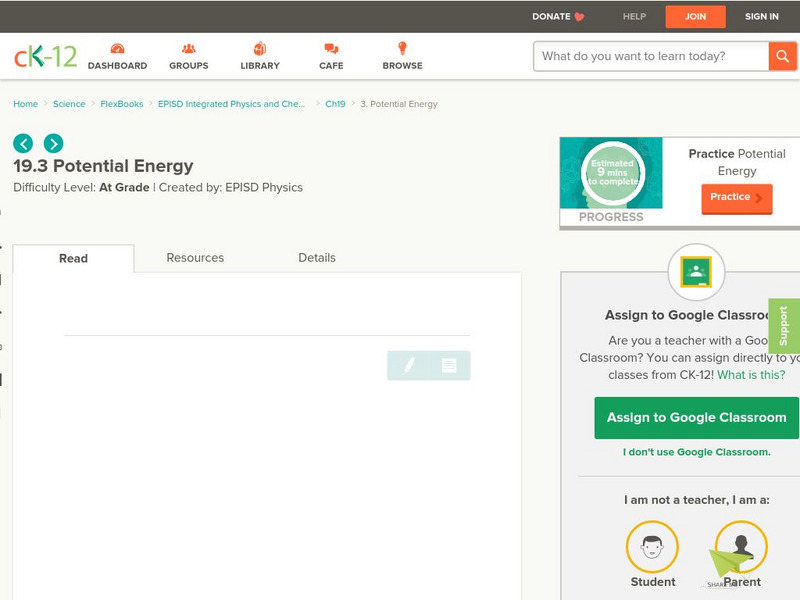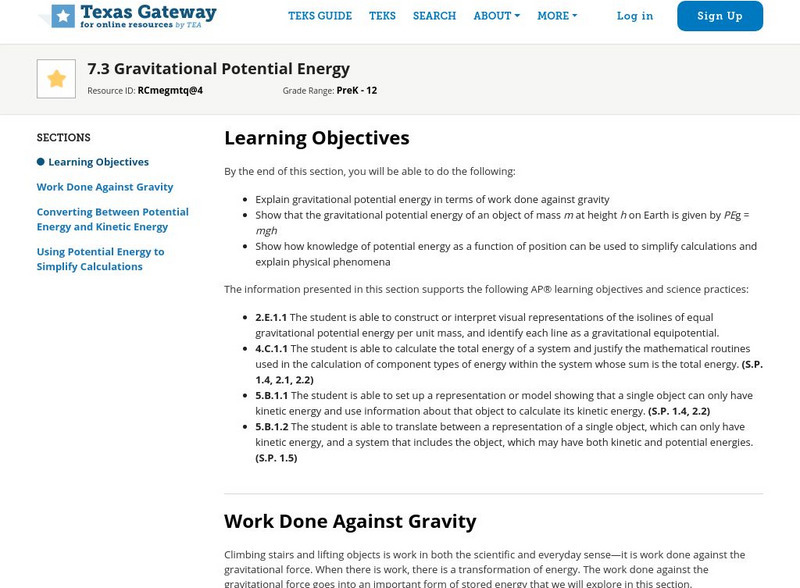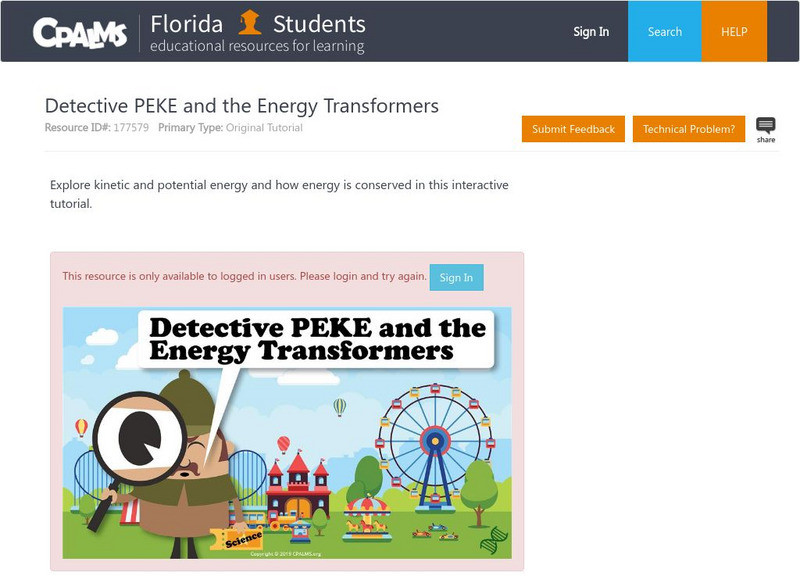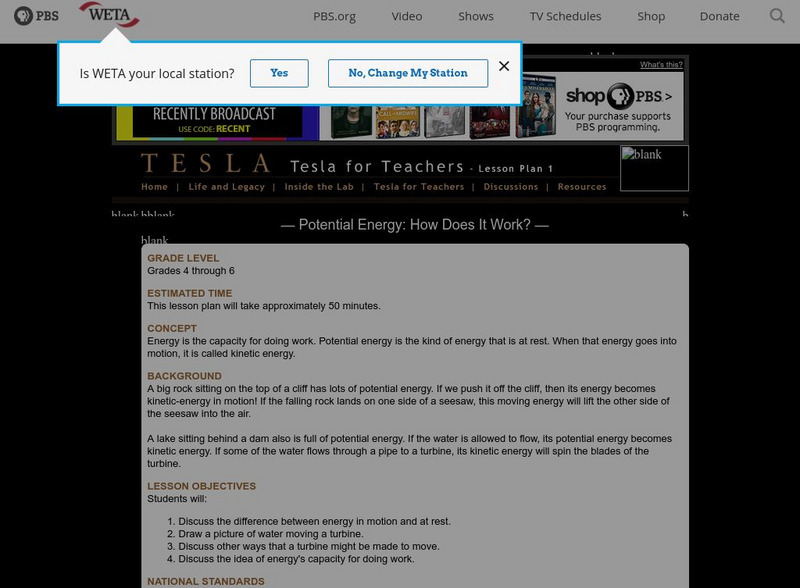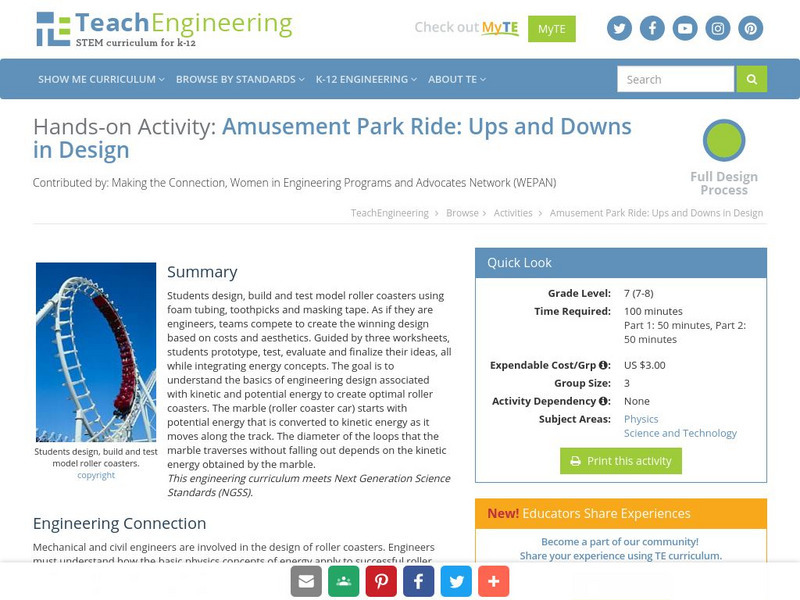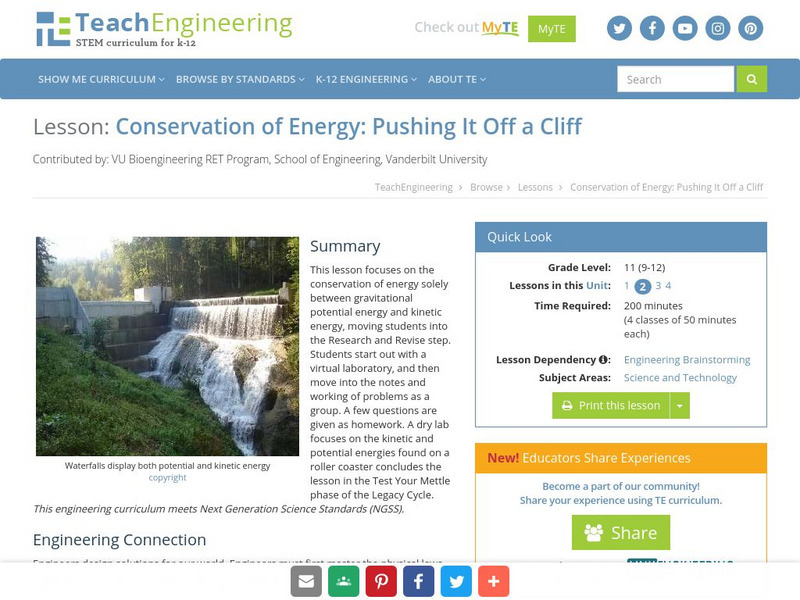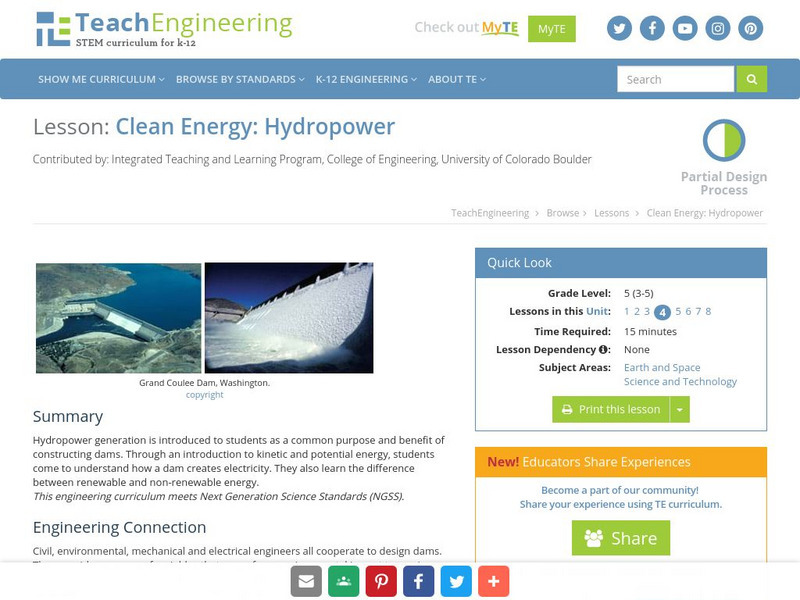Science Buddies
Science Buddies: Paper Roller Coasters: Kinetic and Potential Energy
In this lesson, your students will learn about kinetic and potential energy as they build their own roller coasters from simple classroom materials.
CK-12 Foundation
Ck 12: Potential Energy
[Free Registration/Login may be required to access all resource tools.] Students explore the differences between kinetic and potential energy, and understand how they are dependent on each other.
Science Struck
Science Struck: Difference Between Kinetic and Potential Energy
Explains what kinetic and potential energy are and how they differ.
Concord Consortium
Concord Consortium: Stem Resources: Atoms and Energy
Online activity walks learner through exploration of kinetic and potential energy using animations. Through graphs, a quantitative connection is made between the movement and the energy involved. This information is then related to the...
Texas Education Agency
Texas Gateway: Ap Physics: Gravitational Potential Energy
By the end of this section, you will be able to explain gravitational potential energy in terms of work done against gravity, show that the gravitational potential energy of an object of mass m at height h on Earth is given by PEg = mgh,...
Massachusetts Institute of Technology
Mit: Open Course Ware: Force and Potential Energy
The activity investigates conservation of energy. Some topics explored are friction, kinetic energy, conservation of energy, and potential energy. The resource consists of video clips, lecture notes, practice problems, and exam...
TeachEngineering
Teach Engineering: Kinetic and Potential Energy of Motion
In this activity, young scholars are introduced to both potential energy and kinetic energy as forms of mechanical energy. A hands-on activity demonstrates how potential energy can change into kinetic energy by swinging a pendulum,...
TeachEngineering
Teach Engineering: Energy of Motion
By taking a look at the energy of motion all around us, students learn about the types of energy and their characteristics. They first learn about the two simplest forms of mechanical energy: kinetic and potential energy, as illustrated...
CPALMS
Florida State University Cpalms: Florida Students: Detective Peke and the Energy Transformers
Explore kinetic and potential energy and how energy is conserved in this interactive tutorial.
CK-12 Foundation
Ck 12: Forms of Energy
[Free Registration/Login may be required to access all resource tools.] In this online lesson students will investigate examples of kinetic and potential energy and their transformations.
TeachEngineering
Teach Engineering: Energy
Through nine lessons, students are introduced to a range of energy types--electrical, light, sound and thermal-as well as the renewable energy sources of wind, hydro (water) and solar power. Subjects range from understanding that the...
Open Curriculum
Open Curriculum: Simplifying the Energy Zoo
Physics students find out how to effectively define and clarify kinetic and potential energy.
CK-12 Foundation
Ck 12: Physics Simulation: Power and Efficiency Simulation
Explore kinetic and potential energy by towing objects up a frictionless slope.
PBS
Pbs Teachers: Potential Energy: How Does It Work?
Describe the difference between energy in motion and at rest, and demonstrate energy's capacity for doing work. Draw a picture of water moving a turbine, and discuss other ways that a turbine might be made to move.
Better Lesson
Better Lesson: Drop and Pop Energy and Speed Exploration
Fourth graders use a toy to make observations that speed is related to the amount of energy in an object as well as work with gravitational and elastic potential energy.
Texas Education Agency
Texas Gateway: Work, Energy, and Energy Resources: Summary
This is a summary of the information in Chapter 7: Work, Energy, and Energy Resources for the AP Physics I course online.
TeachEngineering
Teach Engineering: Amusement Park Ride: Ups and Downs in Design
This unit has students design and build foam tubing roller coasters. The design process integrates energy concepts as they test and evaluate their designs that address the task as an engineer would. The goal is for students to understand...
E-learning for Kids
E Learning for Kids: Science: Pirates: What Is Energy Conversion?
This lesson covers the different types of energy, the definitions of kinetic and potential energy, how energy can be converted into different forms, and the law of conservation of energy.
Museum of Science
Museum of Science and Industry: Online Science: Activities: Make a Comeback Can
Step-by-step instructions, with photos, of how to make a metal can come back when it is sent rolling away. The can uses both kinetic and potential energy to roll away and back.
Sophia Learning
Sophia: Kinetic & Potential Energy
This lesson explains how kinetic and potential energy are related.
TeachEngineering
Teach Engineering: Pushing It Off a Cliff
Lesson 2 moves into the Research and Revise step and focuses on the conservation of energy solely between gravitational potential energy and kinetic energy. Students start out with a virtual laboratory, and then move into the notes and...
TeachEngineering
Teach Engineering: Hybrid Vehicle Design Challenge
This module is written for a first-year algebra-based physics class, though it could easily be modified for conceptual physics. It is intended to provide hands-on activities to teach the overarching concept of energy, as it relates to...
Science Buddies
Science Buddies: Balloon Car
Students will design, build, and race balloon-powered cars in this fun lesson that teaches about engineering design and kinetic and potential energy.
TeachEngineering
Teach Engineering: Clean Energy: Hydropower
Hydropower generation is introduced to students as a common purpose and benefit of constructing dams. Through an introduction to kinetic and potential energy, students come to understand how a dam creates electricity. They also learn the...

